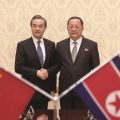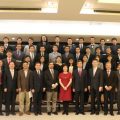UNITED NATIONS – United Nations officials on Tuesday urged a gathering of world leaders and high-ranking representatives of member states and other representatives to help strengthen a new approach to sustaining peace, which aims to put prevention at the heart of UN’s work.

NEW APPROACH
“The first line of the United Nations Charter commits us to saving succeeding generations from the scourge of war,” UN General Assembly President Miroslav Lajcak said in his opening remarks to the High-Level Meeting on Peacebuilding and Sustaining Peace, which runs through Wednesday at UN headquarters in New York.
“In a way, we have met this commitment. There has not, since, been another world war. But, in many other ways, we have not,” he said, noting that a new approach is needed to save people in places of unending conflict, including Syria, South Sudan, Yemen, Libya, Somalia and Afghanistan.
Lajcak said that in 2016, the UN decided to take a new approach: the General Assembly, along with the Security Council, adopted what are now known as the “sustaining peace resolutions,” which renew the world body’s commitment to conflict prevention as embodied in the UN Charter.
Two years on, there are challenges in making this approach a reality, he said, calling for greater international attention to the need for scaled-up efforts to prevent conflict, achieve coherence within the UN system, and expand partnerships, financing, and inclusion.

Echoing Lajcak’s view, Secretary-General Antonio Guterres highlighted the need to strengthen partnerships around all efforts, and at every stage, from conflict prevention and resolution to peacekeeping, peacebuilding and long-term development.
Key partners include governments, the UN, other international, regional and sub-regional organizations, international financial institutions, the private sector, and civil society, including women’s and youth groups, he added.
“Sustaining peace will only be realized through committed, inclusive national ownership that considers the needs of the most marginalized, including women, young people, minorities and people with disabilities,” he said.
The UN chief said more countries are experiencing violent conflicts than at any time in nearly three decades, and that record numbers of people are on the move, displaced by violence, war and persecution.
“Inequalities are increasing. Whole regions, countries and communities can find themselves isolated from progress and left behind by growth. These are all indications that we need greater unity and courage, to ease the fears of the people we serve, to set the world on track to a better future, and to lay the foundations of sustainable peace and development,” Guterres noted.
POTENTIAL OF YOUTH
Jayathma Wickramanayake, UN Secretary-General’s Envoy on Youth, called on member states to increase financing for the peacebuilding work led by youth and see young people as partners in the sustaining peace agenda.
Emphasizing the importance of tapping into the potential and creativity of youth, she noted that 408 million young people are living amid violence and armed conflicts. Greater support must be given to those working on peace and stability in their communities, often with little funding or support, and sometimes under personal threat.
She said two key issues must be immediately addressed: a growing mistrust among youth in political institutions and their exclusion from political and economic life.
Meaningful youth participation contributed to conflict prevention. For too long, young people had been calling on the United Nations to go beyond the immediate needs of war-torn countries by giving more attention to sustaining peace, she said.
“Financing for sustainable peace should be substantially increased, including the youth instrument of the Peacebuilding Fund,” she said.
Concluding, she said young people must be seen as partners in peacebuilding, not as a problem to be dealt with, and reminded delegates that a generation is counting on them to make the right decisions.

Speakers in the opening session included Michelle Yeoh, an actress and UN Development Programme (UNDP) Goodwill Ambassador, and Ishmael Beah, UN Children’s Fund (UNICEF) Advocate for Children Affected by War.
The United Nations has begun shifting its efforts toward prevention, Yeoh said, noting that the resolution has emphasized prevention, inclusion and women’s essential role in the peacebuilding process.
“Indeed, inclusive and sustained peacebuilding required the full participation of women… Gender equality contributed to durable peace and sustainable development,” she said.
Looking forward, funds are needed to advance gender equality, especially in peacebuilding contexts, she said.
Building and sustaining peace is at the core of the United Nations: to save succeeding generations from the scourge of war, sustainable development is needed, she said.
In fact, sustainable development and sustainable peace must be achieved in concert, she added.
In that light, the United Nations needs the time, space and resources to pursue long-term strategies that yield long-term results, she noted.


